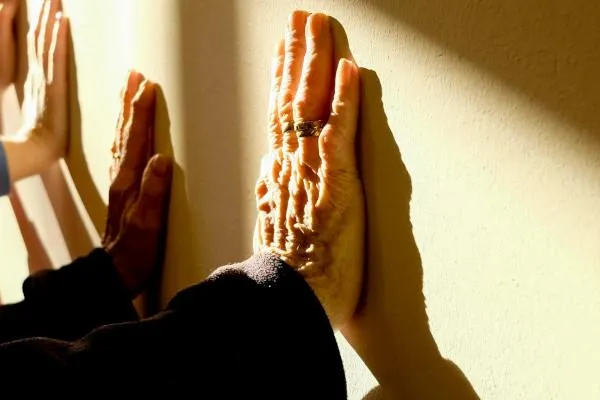OUR BLOG
Symphony of Wimberley
BLOG
Texas Hill Country Assisted Living: Support and guidance for families navigating Assisted Living

Sundowning: An Early Warning Sign of Dementia
Have you noticed that your loved one’s mood changes toward the end of the day? Sundowning, a common symptom of dementia, can cause your loved one to become restless, irritable, frustrated, and confused. This article will explain this symptom, why it happens, and how to manage it.
What Is Sundowning?
Sundowning, also called sundown syndrome, is a behavior found in dementia patients during the evening and night. Sundowning is considered a descriptive term and isn’t formally recognized in the Diagnostic and Statistical Manual of Mental Disorders (DSM). However, the term is often used in clinical settings as the symptoms are common among those with advanced dementia.
Sundowning leads elderly patients with dementia to exhibit symptoms of anxiety, pacing, irritation, or anger towards the end of the day. This symptom, if not managed, can cause dementia patients to have trouble falling asleep or physically remaining in bed. Caretakers can also experience disrupted sleep, making it harder for a full-time caretaker to get necessary rest.
The Causes of Sundowning
Since much more research needs to be conducted regarding sundowning, its exact cause remains unclear. There are many theories as to why it happens, especially in patients with severe dementia. One idea is that the deterioration of the brain from dementia can impact the biological clock. A person with dementia might not be aware of the time of day, which could contribute to activity during sleeping hours.
Another theory supports reasoning due to a decreased production of the sleep chemical melatonin. These issues can affect their ability to sleep when the sun goes down or impact the time they start their night routine.
Other theories include unmet needs, such as lack of sleep or hunger, chronic pain, boredom, or being overly tired after a long day. There has also been speculation that some medications prescribed for dementia can cause side effects such as insomnia that might contribute to sundowning. Sundowning also tends to increase during the winter and fall months when the sun sets earlier.
It also isn’t clear what environments contribute the most to sundowning, such as whether it occurs more when a dementia patient is institutionalized or if they are at home. The prevalence of sundowning as a symptom of advanced dementia ranges from 2.4% to 66%, depending on the study.
Symptoms of Sundowning
Many different symptoms are associated with sundowning. These symptoms tend to occur or get worse as the sun goes down. The severity of the symptoms might depend on how far the illness has progressed. Symptoms of sundowning include:
Restlessness
Agitation
Irritability
Confusion
Anxiety
Pacing
Wandering
Resistance to assistance or redirection
Yelling
Screaming
Mood swings
Abnormally demanding attitude
Paranoia or increased suspicion
Auditory or visual hallucinations
How Is Sundowning Treated?
There are many different forms of treatment for sundowning. Even though most methods haven’t been clinically studied, they are still often used by caretakers of people with dementia. Talk to your doctor before using over-the-counter sleep medicines and ask for advice on treating this symptom.
Most of the recommended treatments include environmental modification, such as reducing outside noise or stimulation in the room. One strategy includes light therapy, where a caretaker can close the curtains to remove the light from the room when it’s time for bed or use light to simulate a rising and setting sun during the fall and winter months. Other types of therapy that might serve to calm an individual with dementia include music therapy and aromatherapy.
How to Prevent Sundowning
While the causes of sundowning aren’t entirely known, caretakers can still take some steps to lessen sundowning symptoms. Those with dementia benefit from daily exercise, making it easier for people to rest at night. A consistent sleep routine can help, along with a structured daily schedule. It’s essential to ensure that the person’s schedule isn’t too packed because too many activities could lead to exhaustion. Naps can help with fatigue during the day, but they shouldn’t be too close to the evening. It’s also recommended to include calming activities before bedtime.
Those with dementia prone to sundowning should also avoid watching violent movies or action-packed television. The hallucination symptom of sundowning can cause those with dementia to think events happening on television or in the film are happening to them in real life, worsening sundowning symptoms. If the person with dementia is prone to hallucinations during sundowning, it helps to turn up the lights to decrease the amount of shadow. However, make sure that the light isn’t too bright to avoid any unnecessary and bothersome glare.
Receiving a dementia diagnosis can be scary and stressful, but it is beneficial to know what to expect. If your loved one’s behavior has changed and the above symptoms seem familiar, it might be time to look into a dementia diagnosis. At Symphony of Wimberley, we offer a memory care program for those in the early and middle stages of dementia. If you aren’t able to care for your loved one with dementia, know that there is help readily available. Our program offers plenty of amenities that keep your loved one’s life comfortable. Their life isn’t over because of a diagnosis. People with dementia can still live a quality life. If you’re interested in learning more about sundowning or other symptoms of dementia, call Symphony of Wimberley today at (512) 243-5852. High-quality care is just one call away. Don’t hesitate to contact us. We’re here to help.
OUR ADDRESS
501 Farm to Market 3237
Wimberley, Texas, 78676
COPYRIGHT 2024 SYMPHONY OF WIMBEREY | ALL RIGHTS RESERVED




Facebook
LinkedIn
Youtube